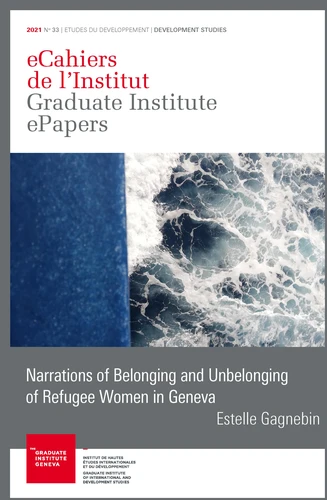Narrations of Belonging and Unbelonging of Refugee Women in Geneva
Par :Formats :
Disponible dans votre compte client Decitre ou Furet du Nord dès validation de votre commande. Le format Multi-format est :
- Pour les liseuses autres que Vivlio, vous devez utiliser le logiciel Adobe Digital Edition. Non compatible avec la lecture sur les liseuses Kindle, Remarkable et Sony
 , qui est-ce ?
, qui est-ce ?Notre partenaire de plateforme de lecture numérique où vous retrouverez l'ensemble de vos ebooks gratuitement
Pour en savoir plus sur nos ebooks, consultez notre aide en ligne ici
- FormatMulti-format
- ISBN978-2-940600-22-9
- EAN9782940600229
- Date de parution27/01/2021
- Protection num.NC
- Infos supplémentairesMulti-format incluant PDF avec W...
- ÉditeurGraduate Institute Publications
Résumé
The present ePaper tries to apprehend how refugee women in Geneva experience their integration journeys, understood as feelings of un/belonging. This study is based on two main beliefs. First, processes of immigrant integration must be understood not solely in terms of economic or social integration but also in terms of the individual's feeling of well-being and belonging. This means that individual perception is the main gateway into understanding how an individual can feel integrated into a new society.
Second, individual identities and characteristics, such as gender, class, religion, etc., are crucial when considering social processes (following the intersectional concept in gender studies). Considering the results of this study, this thesis develops our understanding of the main institutional and social constraints experienced by refugee women in Geneva. It then addresses the experiences of inclusion/exclusion of three clusters of women, considering their various identities and characteristics.
Finally, it examines two main identity strategies used by the women to make sense of their new lives. We extend our heartfelt thanks to the Vahabzadeh Foundation for financially supporting the publication of best works by young researchers of the Graduate Institute, giving a priority to those who have been awarded academic prizes for their master's dissertations.
Second, individual identities and characteristics, such as gender, class, religion, etc., are crucial when considering social processes (following the intersectional concept in gender studies). Considering the results of this study, this thesis develops our understanding of the main institutional and social constraints experienced by refugee women in Geneva. It then addresses the experiences of inclusion/exclusion of three clusters of women, considering their various identities and characteristics.
Finally, it examines two main identity strategies used by the women to make sense of their new lives. We extend our heartfelt thanks to the Vahabzadeh Foundation for financially supporting the publication of best works by young researchers of the Graduate Institute, giving a priority to those who have been awarded academic prizes for their master's dissertations.
The present ePaper tries to apprehend how refugee women in Geneva experience their integration journeys, understood as feelings of un/belonging. This study is based on two main beliefs. First, processes of immigrant integration must be understood not solely in terms of economic or social integration but also in terms of the individual's feeling of well-being and belonging. This means that individual perception is the main gateway into understanding how an individual can feel integrated into a new society.
Second, individual identities and characteristics, such as gender, class, religion, etc., are crucial when considering social processes (following the intersectional concept in gender studies). Considering the results of this study, this thesis develops our understanding of the main institutional and social constraints experienced by refugee women in Geneva. It then addresses the experiences of inclusion/exclusion of three clusters of women, considering their various identities and characteristics.
Finally, it examines two main identity strategies used by the women to make sense of their new lives. We extend our heartfelt thanks to the Vahabzadeh Foundation for financially supporting the publication of best works by young researchers of the Graduate Institute, giving a priority to those who have been awarded academic prizes for their master's dissertations.
Second, individual identities and characteristics, such as gender, class, religion, etc., are crucial when considering social processes (following the intersectional concept in gender studies). Considering the results of this study, this thesis develops our understanding of the main institutional and social constraints experienced by refugee women in Geneva. It then addresses the experiences of inclusion/exclusion of three clusters of women, considering their various identities and characteristics.
Finally, it examines two main identity strategies used by the women to make sense of their new lives. We extend our heartfelt thanks to the Vahabzadeh Foundation for financially supporting the publication of best works by young researchers of the Graduate Institute, giving a priority to those who have been awarded academic prizes for their master's dissertations.



